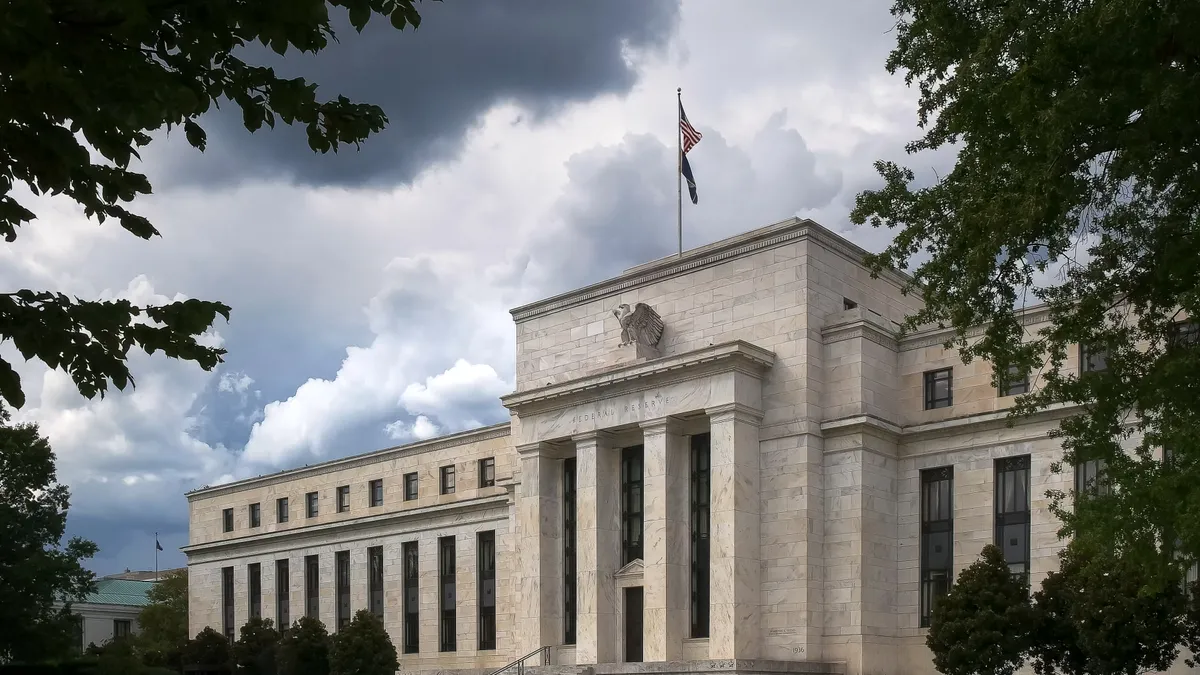Dive Brief:
- The Federal Reserve on Monday released the finalized guidelines it uses to review requests from banks and fintechs to access its master accounts and payment services.
- The guidelines, which the Fed said are “substantially similar” to those it proposed in May 2021 and March of this year, establish a tiered review framework that Reserve Banks will apply to different types of institutions with varying degrees of risk.
- "The new guidelines provide a consistent and transparent process to evaluate requests for Federal Reserve accounts and access to payment services in order to support a safe, inclusive, and innovative payment system," Vice Chair Lael Brainard said in a statement Monday.
Dive Insight:
Under the guidelines, firms that lack deposit insurance or traditional regulatory frameworks would undergo the highest level of scrutiny, while companies with federal deposit insurance would be subject to a “streamlined level of review,” the Fed said.
“In response to public comments, the tiered review framework in the final guidelines was refined to provide more comparable treatment between non-federally-insured institutions chartered under state and federal law,” the Fed said.
The Fed’s guidelines come as an increasing number of nonbanks and fintechs have been vying for access to the central bank’s payment and account services, resulting in fintech and bank trade groups calling on the regulator to provide more clarity in its approach to reviewing and granting applications.
In a joint letter to the regulator, the Bank Policy Institute, the American Bankers Association (ABA), the Consumer Bankers Association, the Independent Community Bankers of America, the Mid-Size Bank Coalition of America and The Clearing House said the updated guidelines the Fed proposed in March did not adequately address how the Fed would evaluate “novel charter” applicants.
In its own letter, the Financial Technology Association (FTA), which represents fintechs Stripe, MoneyLion, Afterpay and others, endorsed the Fed’s effort to clarify its approach to reviewing applications but urged the regulator to avoid an overly rigid standard that could discourage new entrants.
In a statement Monday, ABA CEO Rob Nichols welcomed the new guidelines and urged the central bank to require fintechs to meet the same standards as banks when it comes to accessing the Fed’s system.
“Allowing new financial players to access the Federal Reserve system without requiring them to meet the same high standards as banks poses real risks,” he said. “We will watch carefully to ensure that these new guidelines, particularly the tiering requirements, recognize those risks, and we look forward to seeing the Board and the Reserve Banks apply these guidelines fairly but rigorously.”
The debate over the Fed’s master accounts made its way into a congressional hearing this year, when Republicans in February raised the issue during the nomination process for Sarah Bloom Raskin, a former candidate to serve as the central bank’s vice chair for supervision.
Sen. Cynthia Lummis, R-WY, implied that Raskin used her influence as a recent Fed governor to help Reserve Trust, a fintech, gain a Fed master account.
The Federal Reserve Bank of Kansas City denied Reserve Trust’s first application for a master account in June 2017, a month after Raskin joined the fintech’s board.
Lummis said the fintech was granted a Fed master account after Raskin called the Kansas City Fed in August 2017 about the denied application.
Raskin eventually withdrew her nomination after failing to garner sufficient support in the Senate.
The Fed’s process for approving master accounts also is the subject of a recent lawsuit filed by Wyoming-based Custodia Bank.
The digital-asset bank, formerly known as Avanti, filed a complaint against the Fed and the Reserve Bank of Kansas City in June over what it claims is an “unlawful delay” in processing its application for a master account.
Custodia Bank was granted a state special-purpose depository institution (SPDI) license in 2020.
The bank applied for a master account with the Fed in October 2020 and has been waiting more than a year for its application to be approved, despite the Fed’s standard form agreement that states “[p]rocessing may take 5-7 business days,” according to the bank’s complaint.
The Kansas City Fed’s refusal to answer questions from Sen. Pat Toomey, R-PA, about its master account protocol for Reserve Trust spurred two letters from lawmakers — one from Toomey himself, then a second from Senate Banking Committee Republicans suggesting they would pursue legislation to force the central bank into more transparency and accountability to Congress.











